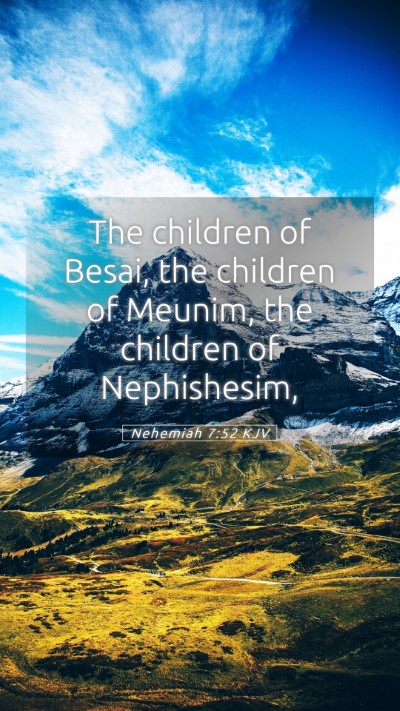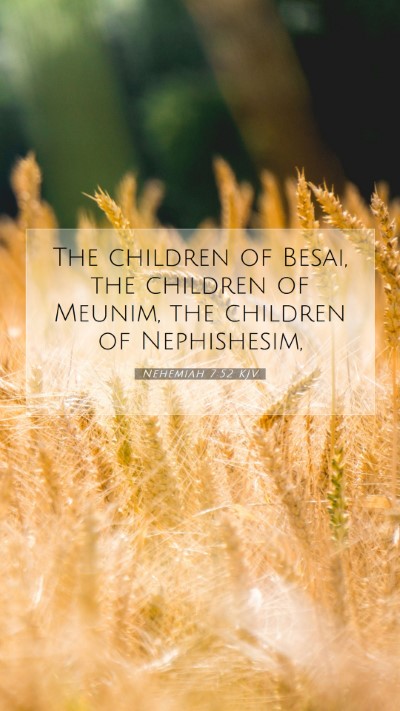Understanding Nehemiah 7:52: A Comprehensive Commentary
The verse Nehemiah 7:52, part of the Old Testament, provides vital context within the story of the Israelites' return from exile and the rebuilding of Jerusalem. This verse, which details the genealogy and numbers of the people who returned, invites deep reflection and interpretation. Below, we synthesize insights from respected public domain commentaries to offer a profound understanding of this scripture.
Bible Verse and Context
Bible Verse: Nehemiah 7:52
Verse Text: "The children of Harim, three hundred and twenty."
This verse is part of a larger list detailing those who returned to Jerusalem, showing the importance of genealogy and lineage in Jewish culture.
Significance of Genealogy
Genealogies in Scripture serve several significant purposes:
- Identity: They establish the identity of the returning exiles, affirming their heritage as God's chosen people.
- Covenant Continuity: Genealogies reflect God's faithfulness to His covenant promises over generations.
- Community and Order: Lists like this ensure that all returning individuals are accounted for, fostering community rebuilding.
Insights from Commentaries
Several key commentaries offer valuable insights into Nehemiah 7:52:
- Matthew Henry: Henry emphasizes the significance of numbers in the context of God’s providence, noting that every individual counts in God’s plan for restoration.
- Albert Barnes: Barnes elaborates on how these lists not only record historical data but also demonstrate the unity and diverse backgrounds of the people, suggesting a greater tapestry of God's plan.
- Adam Clarke: Clarke stresses the importance of acknowledging families and clans, interpreting this verse as an affirmation of community roles in rebuilding the post-exilic society.
Biblical Exegesis and Application
As we delve deeper into the biblical exegesis of Nehemiah 7:52, there are several critical themes and applications for modern readers:
- Historical Context: Understanding the historical backdrop of Nehemiah's time, when the Israelites returned under Persian authority, enhances appreciation of the struggle and hope for restoration.
- Faithfulness of God: The meticulous record-keeping showcases God’s unfailing promise to His people, reminding us today of His ongoing faithfulness in our lives.
- Community Importance: This verse reinforces the role of community in spiritual and societal rebuilding, encouraging present-day believers to engage in community efforts, like Bible study groups, to cultivate faith together.
Application of the Verse in Daily Life
The implications of Nehemiah 7:52 extend beyond historical significance into practical application in daily life:
- Recognizing Heritage: Embrace your spiritual heritage; understand the role of your family and community in your faith journey.
- Valuing Every Contributor: Just as each individual is recorded in the genealogy, we must recognize the value of each member in our communities and churches.
- Encouraging Participation: In your Bible study insights, include discussions around the importance of each person’s contribution to the faith community.
Cross References
For a more enriched understanding, consider these related verses:
- Ezra 2:61-63: Discusses genealogical records particularly pertinent to the Levites.
- Nehemiah 3:1-32: Outlines the work of various individuals in the rebuilding of the wall, correlating to the theme of community effort.
- 1 Chronicles 9:1: Contains a list of those returned, reinforcing the importance of records and genealogy.
Conclusion
Nehemiah 7:52, while seemingly a simple numerical record, opens windows into rich theological, historical, and practical insights. Through understanding scripture analysis and applying these lessons, we foster both individual and communal growth in our faith journeys. Let this verse remind us of the legacy of faith that connects us and the active role we play in God’s ongoing narrative.


